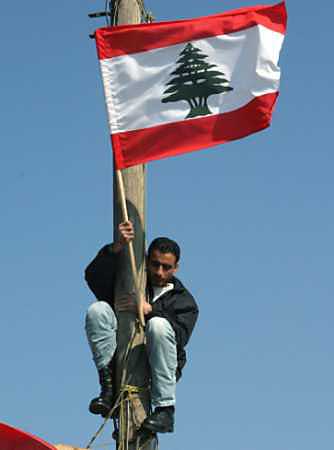
A Lebanese protester raises the country's flag near the
Syrian intelligence offices in Beirut, March 15, 2005. Syrian intelligence
agents began evacuating their headquarters in Beirut on Tuesday, partially
meeting a key U.S. and Lebanese opposition demand for an end to three decades of
Syrian tutelage over its neighbor.(Photo: Reuters/China
Daily)
Syrian intelligence units have started to leave Beirut in a further step
toward ending Syria's military presence in Lebanon. The move came a day after
close to a million people rallied in central Beirut to demand a complete pullout
of Syrian troops.
Up until recently, Syria had 14,000 troops in Lebanon
but has stated withdrawing its forces amid intense international pressure.
On Tuesday, Syrian Ambassador to the United States, Imad Moustapha, said
that the 10,000 Syrian troops still in Lebanon would be withdrawn across the
border.
"Our intention is very clear, we want to withdraw from Lebanon
as soon as possible, the sooner the better. But, we don't want to do this in a
way to create a certain vacuum in Lebanon that might be used by any element that
can create some destabilisation or some chaos in Lebanon."
Moustapha
also defended the Lebanese militant group Hezbollah as a grass-roots political
movement and invited the US administration to help it evolve into a "purely
political movement."
"This is a historical opportunity for the United
States to stop repeating Israeli propaganda about Hezbollah and try to
understand it is a national liberation movement that fought the Israeli
occupation."
Meanwhile in Washington, US President George W. Bush called
for disarmament by Hezbollah and opened up the possibility of accepting it as
part of the political mainstream.
In a meeting with Jordan's King
Abdullah, Bush criticized Hezbollah for derailing the Middle-east peace process
by launching attacks against Israel from southern Lebanon.
"We view
Hezbollah as a terrorist organization and I would hope that Hezbollah would
prove that they're not by laying down arms and not threatening peace."
Hezbollah is considered a legitimate resistance movement in Lebanon.
It led the guerrilla war against Israel's 18-year presence in part of
its territory and showed its political influence in recent weeks, by drawing
hundreds of thousands of people to central Beirut for two pro-Syria rallies.



